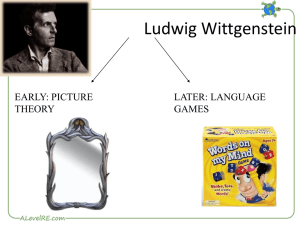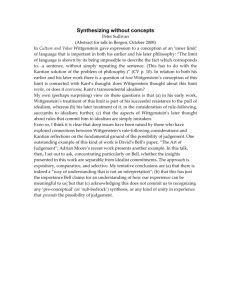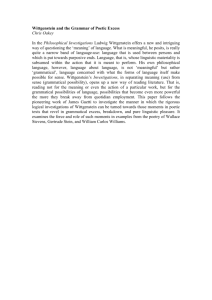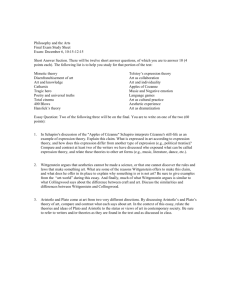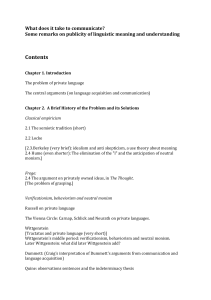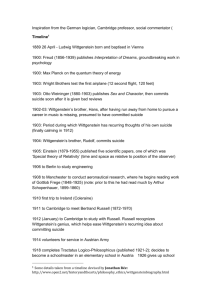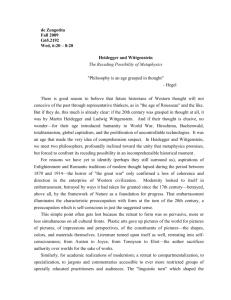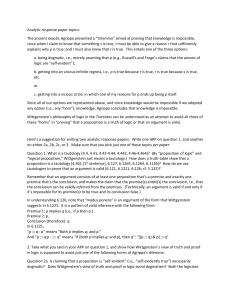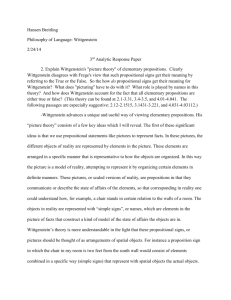Language Game
advertisement
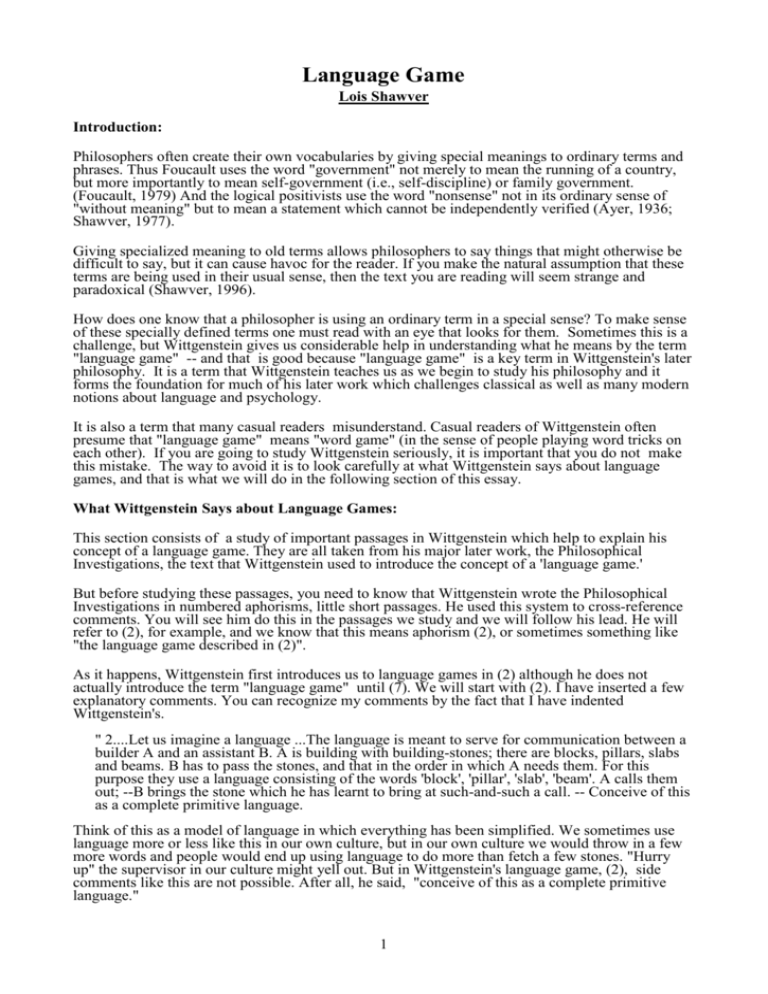
Language Game Lois Shawver Introduction: Philosophers often create their own vocabularies by giving special meanings to ordinary terms and phrases. Thus Foucault uses the word "government" not merely to mean the running of a country, but more importantly to mean self-government (i.e., self-discipline) or family government. (Foucault, 1979) And the logical positivists use the word "nonsense" not in its ordinary sense of "without meaning" but to mean a statement which cannot be independently verified (Ayer, 1936; Shawver, 1977). Giving specialized meaning to old terms allows philosophers to say things that might otherwise be difficult to say, but it can cause havoc for the reader. If you make the natural assumption that these terms are being used in their usual sense, then the text you are reading will seem strange and paradoxical (Shawver, 1996). How does one know that a philosopher is using an ordinary term in a special sense? To make sense of these specially defined terms one must read with an eye that looks for them. Sometimes this is a challenge, but Wittgenstein gives us considerable help in understanding what he means by the term "language game" -- and that is good because "language game" is a key term in Wittgenstein's later philosophy. It is a term that Wittgenstein teaches us as we begin to study his philosophy and it forms the foundation for much of his later work which challenges classical as well as many modern notions about language and psychology. It is also a term that many casual readers misunderstand. Casual readers of Wittgenstein often presume that "language game" means "word game" (in the sense of people playing word tricks on each other). If you are going to study Wittgenstein seriously, it is important that you do not make this mistake. The way to avoid it is to look carefully at what Wittgenstein says about language games, and that is what we will do in the following section of this essay. What Wittgenstein Says about Language Games: This section consists of a study of important passages in Wittgenstein which help to explain his concept of a language game. They are all taken from his major later work, the Philosophical Investigations, the text that Wittgenstein used to introduce the concept of a 'language game.' But before studying these passages, you need to know that Wittgenstein wrote the Philosophical Investigations in numbered aphorisms, little short passages. He used this system to cross-reference comments. You will see him do this in the passages we study and we will follow his lead. He will refer to (2), for example, and we know that this means aphorism (2), or sometimes something like "the language game described in (2)". As it happens, Wittgenstein first introduces us to language games in (2) although he does not actually introduce the term "language game" until (7). We will start with (2). I have inserted a few explanatory comments. You can recognize my comments by the fact that I have indented Wittgenstein's. " 2....Let us imagine a language ...The language is meant to serve for communication between a builder A and an assistant B. A is building with building-stones; there are blocks, pillars, slabs and beams. B has to pass the stones, and that in the order in which A needs them. For this purpose they use a language consisting of the words 'block', 'pillar', 'slab', 'beam'. A calls them out; --B brings the stone which he has learnt to bring at such-and-such a call. -- Conceive of this as a complete primitive language. Think of this as a model of language in which everything has been simplified. We sometimes use language more or less like this in our own culture, but in our own culture we would throw in a few more words and people would end up using language to do more than fetch a few stones. "Hurry up" the supervisor in our culture might yell out. But in Wittgenstein's language game, (2), side comments like this are not possible. After all, he said, "conceive of this as a complete primitive language." 1 6. We could imagine that the language of (2) was the whole language of A and B; even the whole language of a tribe. The children are brought up to perform these actions, to use these words as they do so, and to react in this way to the words of others. Notice that Wittgenstein says that people are trained to "react in this way" to the words of others. In this language game, then, people seem to be using language to prompt people to do particular things (bring beams or slabs). Think of other "reactions" a similar language game might intend to prompt. Imagine, for example, that when the work supervisor of another tribe called out "beam" the worker was to take the beam behind a fence. Or imagine that the task was to crush the beam with a big stone. Observe, however, that in all such simple situations, there is just the word and a single correct response. Since these correct responses are not being thought of as inherited reflexes, we might ask how they are acquired? Wittgenstein addresses this concern in (7). 7. In the practice of the use of language (2) one party calls out the words, the other acts on them. In instruction in the language the following process will occur: the learner names the objects; that is, he utters the word when the teacher points to the stone.--And there will be this still simpler exercise: the pupil repeats the words after the teacher--both of these being processes resembling language. Wittgenstein has just given us two different training exercises that could be used to assist children in learning this primitive language game. In one of these, the adult points to objects and names them and in the other the adult simply says the word (such as "beam") and the child repeats the word mechanically after the adult. These are familiar exercises for teaching children any language. Notice, however, that teaching a child how to pronounce a term or name an object does not thereby teach the child how to use the term. 31. When one shows someone the king in chess and says: "This is the king", this does not tell him the use of this piece--unless he already knows the rules of the game up to this last point... Only when the student knows the game of chess, has some idea that the pieces move about a board and that players try to win by capturing the other's pieces, and what that means, can the teacher's statement "This is the king" show the student how to use this information to play the game of chess. 31. (continued) We may say: only someone who already knows how to do something with it can significantly ask a name. How can you ask a name, for example, for a mathematical function that quantum physics uses if you do not know anything about quantum physics? And when the child first learns to speak a simple word like "dog", the term does not necessarily fit into its schema of things in a comfortable way. We can imagine that it would be applied to a range of inappropriate things, not only cows and pigs, but it might be used to mean I want to go outside (where the child encountered the dog.) And this may happen more than we realize because we are so familiar with the concept "dog" that we could well presume that the child was using it within the rules of our language when the child is not. The point is that even though the exercises of pointing and naming may be useful in learning a language game, they are not enough to explain the acquisition of meaningful language . There is, however, another form of training children in language that will be helpful here. Philosophically, our culture tends to overlook this training, widespread though it is, in favor of training in pointing and naming. Wittgenstein introduces this other form of training when he says: 7 (continued) We can also think of the whole process of using words in (2) as one of those games by means of which children learn their native language. I will call these games 'language-games' and will sometimes speak of a primitive language as a language-game. And the processes of naming the stones and of repeating words after someone might also be called language-games. Think of much of the use of words in games like ring-a-ring-a-roses. 2 Also, think of "patty-cake, patty-cake, baker's man," or think of "this little piggy went to market, this little piggy..." What is distinctive about such children's games is that they can be learned without the children knowing what the words mean. The words can be memorized along with specific actions corresponding to the words (e.g., "all fall down"). Primitive language games such as (2) are rather like that. The worker might learn to bring a beam on command without knowing the purpose of the beam. And children learning English are taught such mechanical responses before they understand the meaning of what they do and say. "How old are you?" the adult says, and the child holds up three fingers without knowing that each finger stands for a year -- or even what a year is. All of these things are "language games", but Wittgenstein adds: (7 continued) I shall also call the whole [of language], consisting of language and the actions into which it is woven, the 'language-game.'" In summary, then, the term "language game" has several related meanings. Sometimes it will refer to the primitive models of language that Wittgenstein constructs for us to study, sometimes to the supporting language practices that enable children to learn and finally, it will refer to the whole of a language like German or English as a "language game." Then, in (23), Wittgenstein begins drawing a relationship between primitive language games and similar language games that are contained within a full language such as English. Here he speaks of the multiplicity of language games. He says: "23...Review the multiplicity of language games in the following examples, and in others: Giving orders, and obeying them-Describing the appearance of an object, or giving its measurements-- Constructing an object from a description (a drawing)-Reporting an event-Speculating about an event-Forming or teasing a hypothesis-Presenting the results of an experiment in tables and diagrams-Making up a story; and reading it-Singing catches-Guessing riddles-Making riddles-Making a joke; telling it-Solving a problem in practical arithmetic-Translating from one language into another-Asking, thanking, cursing, greeting, praying. Ask yourself how are these individual games are similar to (2)? Like (2) they each have their own unique rules. The words "A large bear came upon the scene" is understood differently if one thinks of it as a description, a reporting of an event, a forming of a hypothesis, or the telling of a story. This means, there are different rules for interpreting words in the different language games. And so, in English, there are many kinds of language games. How many kinds? Countless kinds. He says: 23. (continued) But how many kinds of sentence are there? Say assertion, question, and command? --There are 'countless' kinds: countless different kinds of use of what we call 'symbols', 'words', 'sentence'. And this multiplicity is not something fixed, given once for all; but new types of language, new language games, as we may say, come into existence and others become obsolete and get forgotten. (We can get a 'rough picture' of this from the changes in mathematics.) Complicating matters further, we soon learn that we can organize a whole language into its component language games using various schemes just as we might organize a collection of stones according to their size or according to their color. We organize them one way for one purpose and another way for another purpose. Wittgenstein says: 3 23. (continued) Here the term 'language game' is meant to bring into prominence the fact that the 'speaking' of language is part of an activity, or form of life. In summary, the term "language games" has a family of related meanings. It refers to models of primitive language that Wittgenstein invents to clarify the working of language in general. It refers to games that children play that enables them to learn language and it refers to a multiplicity of language practices in our ordinary languages as well as the whole of any ordinary language. But for all of that complexity, it has some specific connotation that highlights certain dimensions of language that often pass unnoticed. It draws our attention to the way language works to prompt a desired (or perhaps undesired) response. It also draws our attention to the way in which these language games can be learned before we have mastered the individual concepts used in the game. And it will later draw our attention to the way in which we can confuse language games and become muddled, how this is a natural and inevitable part of any philosophical attempt. And, finally, the concept presents itself as a way of analyzing those muddles so as to dispel them. Why talk of language games? Wittgenstein talks of language games primarily to teach us to dispel our language confusions, but this does not lead to a philosophy that tells us how to use language in our ordinary lives. Although Wittgenstein's earlier work was concerned with such a project, his later philosophy, in which he introduces the term "language games," is not. He says: 130. Our clear and simple language-games are not preparatory studies for a future regularization of language--as it were first approximations, ignoring friction and air-resistance. The languagegames are rather set up as 'objects of comparison' which are meant to throw light on the facts of our language by way not only of similarities, but also of dissimilarities. The idea is that if we think in terms of language games, if we ask how our language games are taught and how they are used, then we will begin to see past certain myths in our culture that trap us in a particular pictures. Getting past these pictures will enable us to see psychology with fresh eyes, but what we see is not predetermined. Wittgenstein does not tell us what we will see. He simply helps us see past these ancient pictures because --. 115. A 'picture' held us captive. And we could not get outside it, for it lay in our language and language seemed to repeat it to us inexorably. His purpose is simply to help us see pass these muddles. He says: 464. My aim is: to teach you to pass from a piece of disguised nonsense to something that is patent nonsense References: Ayer, A. J. (1936). Language, Truth and Logic. Oxford University Press. Foucault, Michel (1979). Governmentality. Ideology and Consciousness, No. 6, Summer 1986, 521. Shawver, L. (1996).What postmodernism can do for psychoanalysis: A guide to the postmodern vision. The American Journal of Psychoanalysis, 56(4), pp.371-394. Shawver, L. (1977). Research variables in psychology and the logic of their creation. Psychiatry, 40, 1-16. Wittgenstein, Ludwig. Philosophical Investigations. New York: The Macmillan Company, 1965. 4
